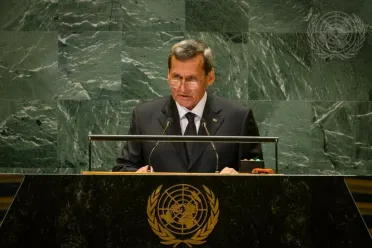Statement
Statement summary
RASHID MEREDOV, Deputy Chairman of the Cabinet of Ministers and Minister for Foreign Affairs of Turkmenistan, spotlighted his country’s efforts to promote a “model of neutrality” within the United Nations, recalling that 2025 will mark the thirtieth anniversary of a General Assembly resolution recognizing Turkmenistan’s neutral status. Stating that “the time has come to reflect on the significance of neutrality for global politics, and its potential in the current strategic landscape”, he proposed an initiative to accord neutral countries “priority partnership” with the United Nations in its peacekeeping efforts. Additionally, he spotlighted his country’s Assembly resolution declaring 2025 as the “International Year of Peace and Trust”, stating that Turkmenistan will “take the leading role in organizing relevant events”. Nevertheless, it will rely on the support of all Member States and the Secretariat to ensure that the year becomes “a manifestation of the goodwill of the international community”.
Turning to Afghanistan, he underlined the importance of supporting the Afghan people’s aspirations to “begin peaceful, constructive work to rebuild the economic and social spheres”. For its part, Turkmenistan — together with international partners — is implementing several major infrastructure projects in the country, including the construction of a “strategic Turkmenistan-Afghanistan-Pakistan-India gas pipeline”. Others will see the construction of power-transmission and fibre-optic communication lines along the Turkmenistan-Afghanistan-Pakistan route, as well as a new railway from Turkmenistan to Afghanistan. He also emphasized that his country’s humanitarian aid to the Afghan people will continue, including building social facilities and educating Afghan students in Turkmenistan’s educational institutions. Turkmenistan, he went on to say, will additionally focus on protecting the environment in Central Asia and the Caspian Sea region.
In that context, he urged more active, extensive UN involvement in “saving the Aral Sea”. Also pointing to Central Asia’s struggle with desertification and reduced water resources, he said these challenges requires the “presence of [UN] resident offices in the region on a permanent basis”. He added that “Turkmenistan is ready to work on this”, proposing the establishment of a specialized regional centre for climate-related technologies. And, emphasizing that preserving the Caspian Sea as a “unique natural complex” is not just an internal affair for littoral States — but a global problem — he urged systematic, targeted cooperation with Caspian States to combat the ecological and climate issues affecting the Sea. While noting that the approaching eightieth anniversary of the UN should be a time for reflection, assessment and correction, he underscored that commitment to UN values, principles and goals must remain “unshakeable” — “because they have proven their viability and alignment with the fundamental long-term interests of humanity”.
Full statement
Read the full statement, in PDF format.
Photo

Previous sessions
Access the statements from previous sessions.
